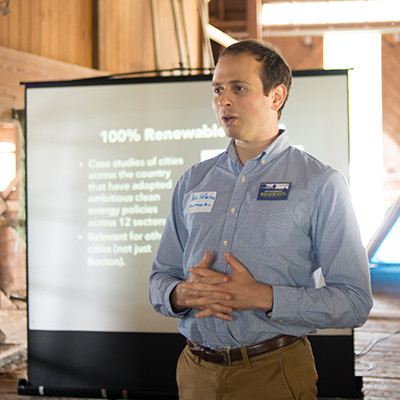Finally! After more than year of gridlock, Governor Baker signed a bill that lifts restrictive caps on solar, opening the door for enough solar to power 100,000 Massachusetts homes with clean energy. The bill is a necessary step that will allow solar to continue to expand — but there is more work to do to put Massachusetts on track towards 100% clean, renewable energy.
Let’s go over the good news. First and foremost, the bill lifted the cap on net metering. Put simply, net metering makes sure homes and businesses are properly credited for the extra solar energy they produce. By increasing the net metering caps, solar programs that had been on hold can finally move forward. According to one study from SEIA and Vote Solar, more than 500 solar projects have been on hold because of the net metering caps.
It’s no coincidence: States that have the strongest pro-solar policies are where solar thrives. In the past, Massachusetts has championed policies that made it a solar leader, ranking 5th in solar installed in 2015.
Environment Massachusetts played a central role in driving this bill over the finish line: building a powerful grassroots movement that generated nearly 2,000 calls to elected officials, mobilizing over 1,000 local business owners, faith leaders, low-income advocates, and other prominent community leaders to make their voices heard, generating a lot of buzz in the media, releasing 10 research reports, and bringing the message directly to state officials. Perhaps most notably, we helped to get 100 lawmakers signed onto a letter urging legislative leaders to lift the caps.
While we’re glad to see that solar will continue to grow, the news isn’t all good. The new law will cut the value of many solar credits by 40%, and it also opens the door for utilities to impose fees on solar customers. We are concerned that the decreased benefits and newly instituted charges could make it harder for many, especially renters and low-income families, to access solar.
What’s more, solar is growing so quickly that we expect that the caps will be hit again soon. As Senator Ben Downing said, Massachusetts needs a “comprehensive process as CA, NY, and other states have gone through that avoids this stop and start.” We agree!
Huge thank-yous are in order to everyone who stood with us to get this bill passed. We look forward to pushing for even stronger solar policies in Massachusetts and across the country.
Sources
-
Governor Baker Signs Comprehensive Solar Legislation into Law, Mass.gov, April 11, 2016.
-
Legislative committee reaches deal on solar power bill, Boston Herald, April 6, 2016.
-
Stalled Solar Projects In Massachusetts, March 27, 2016.
-
Breaking: California’s NEM 2.0 Decision Keeps Retail Rate for Rooftop Solar, Adds Time-of-Use, Greentech Media, January 28, 2016.
-
Gov Baker: New Solar Energy Law Creates Path for Mass. To Lead Industry, WBUR, April 11, 2016.

